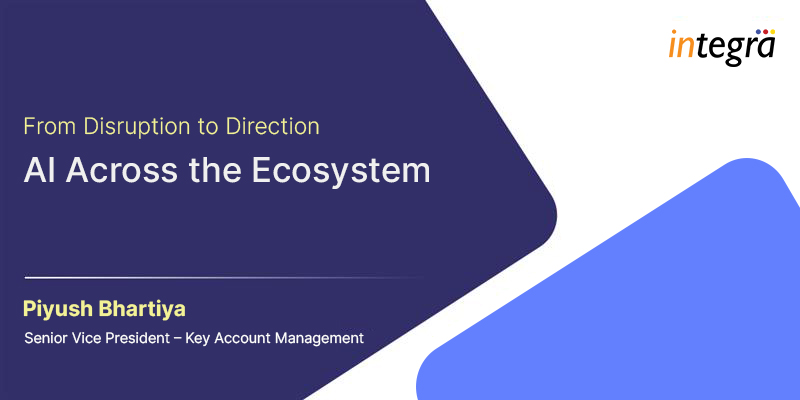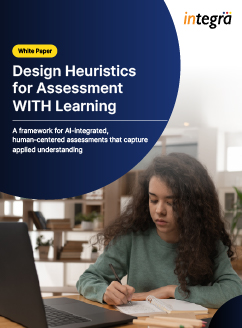Digital Course Assembly Services
Structured authoring and course build support for K-12 and higher education platforms
Integra’s Digital Content Assembly Services standardize inputs, assemble courses, author assessments, and manage corrections, giving you predictable delivery, platform-ready content, and stable course experiences across K-12 and higher education programs.
Let's TalkBuilding Course-Ready Digital Content at Scale
Educational publishers in K–12 and higher education manage growing volumes of content across print materials, digital courseware, assessments, and platform-specific formats. Teams must coordinate manuscripts, legacy documents, media assets, and structured files while meeting schedules, curriculum expectations, and platform rules. As programs expand, the variety of inputs increases, creating added pressure to maintain structure, track revisions, and prepare materials that work across multiple delivery environments. Publishers also face rising expectations for accuracy, accessibility, and consistent learner experience, which place additional demands on editorial and production teams. These conditions create operational challenges that directly influence course assembly, assessment development, and ongoing maintenance work.

Key Challenges
Fragmented Inputs: Multiple file types, versions, and sources require extensive preparation, increasing risks of missing assets and structural inconsistencies.
Complex Course Structures: Detailed course maps, mixed components, and varied sequence rules create workload spikes and introduce opportunities for mapping errors.
Engine-Specific Requirements Assessment engines demand strict formatting, scoring rules, and templates, limiting flexibility and slowing large assessment development cycles.
Maintenance and Updates Active courses require frequent updates tracked across systems, creating challenges with version alignment and timely implementation.
Platform Transitions Migrating content between platforms requires careful asset mapping and structure checks to prevent functional issues and broken dependencies.
Digital Course Authoring and Assembly
Course Assembly
The team prepares manuscripts and assets for course maps, restructures files, and integrates components such as PDFs, ePubs, interactivities, PPTs, and flashcards. Structured content, functional checks, and accessibility reviews create platform-ready modules that align with your mapped learning sequence.
Course and Content Build
Course and Content Build converts manuscripts into mapped learning objects with organized content, aligned assets, and new digital components when needed. Simulations, illustrations, animations, audio, and video are produced to match course intent, providing complete modules ready for platform onboarding and internal review.
Assessment Authoring
Assessment Authoring produces items directly in assessment engines, manages templates, and configures scoring and feedback. Teams create quizzes, adaptive assessments, and test banks that match learning objectives and platform rules, supporting timely product development across engines such as Learnosity, QuAD, and proprietary systems.
Course Maintenance and Corrections
Maintenance work covers item fixes, content edits, and algorithm adjustments tracked through ticketing systems such as JIRA. Subject matter and editorial teams address required changes, while technical staff update interactivities or assets, keeping active courses accurate, current, and aligned with platform expectations.
Content and Asset Migration
Migration services move course materials from retiring platforms into new environments, aligning assets, updating formats, and validating navigation. Teams track course structures, map dependencies, and run content, functional, and accessibility QA so migrated courses retain integrity and operate correctly within the new system.
Testing and QA
Testing and QA covers content review, functional testing, and accessibility checks across course elements. Structured validation identifies issues early, supports predictable platform behavior, and helps maintain a consistent experience for instructors and learners throughout the course lifecycle.
To learn more about this service and how it can add value to your goals, let’s schedule a quick conversation. We’d be happy to walk you through the details and answer any questions you may have.
Let's TalkExplore Case Studies
Why Choose Integra?

Structured Workflows: Defined processes for assembly, assessments, and migration support predictable output quality and reduce production uncertainties.
Platform Familiarity: Experience with assessment engines, authoring tools, and LMS integrations reduces rework and supports reliable digital course launches.
Structured QA Approach: Content, functional, and accessibility QA checks reduce support issues and protect learner and instructor experience.
Ticket-Driven Maintenance: Use of systems such as JIRA for corrections, tracking, and reporting gives you transparency and control during course updates.
Scalable Production Capacity: Ability to handle multiple courses, titles, and product lines in parallel supports backlist conversions and new program launches.
Frequently Asked Questions
Q1: How do we know when our legacy print content is ready for digital ingestion?
You know you're ready when the source files are well-organized, metadata is complete, file formats are standardised (e.g., Word/PDF, images, media), and editorial teams have agreed structure and versioning. Many publishers trip up when manuscripts, assets and legacy files remain scattered or inconsistent, slowing conversion and raising risk of missing components.
Q2: What are the common bottlenecks in migrating large backlists into a digital platform?
Typical bottlenecks include: multiple source formats that require manual conversion; inconsistent metadata or missing taxonomy details; lack of automation for batch ingestion; and platform-specific integration issues (e.g., LMS/assessment engine formats). These slow delivery and increase costs.
Q3: How can publishers ensure content works across different LMS platforms without creating multiple versions?
To avoid creating multiple versions, publishers should use flexible formats, adhere to industry standards (e.g., LTI, standards for assessments), and maintain a "single source of truth" approach for content. The goal is “publish once, deliver anywhere” so that content is packaged or adapted rather than recreated from scratch for each LMS.
Q4: What should we consider when integrating assessments into a digital course build?
When integrating assessments, consider engine compatibility (item types, scoring rules), metadata alignment (standards/learning objectives), version control (to support future corrections), and QA for both functionality and pedagogy. Many schools raise issues when assessments behave differently in different platforms or lack proper alignment.
Q5: How do we maintain content accuracy and accessibility throughout multiple editions or updates?
Maintaining accuracy and accessibility requires structured version control, clear tracking of updates, and defined QA checks across content, functionality, and accessibility. Reviews follow WCAG 2.2 guidelines, which underpin expectations in markets that reference Section 508, ADA, BS 8878, or the European Accessibility Act. This helps publishers keep materials consistent and usable as programs evolve.
Get notified of our latest blogs
Explore Expert Insights

From Disruption to Direction: AI Across the Ecosystem
This is Part II of my "From Disruption to Direction" series. In Part I, I reflected on my journey with Integra and the broader transformations reshaping education publishing. In this...
Read More ➜
The Editorial Office of the Future: What Will It Take to Stay Credible, Resilient, and Trusted by 2030?
Last Friday, Integra hosted a highly engaging webinar, The Editorial Office of the Future, bringing together editorial leaders from across scholarly publishing to examine how editorial offices must evolve in...
Read More ➜
Powering the Editorial Office of the Future
Editorial Excellence at Scale, Without Compromising Trust Scholarly publishing stands at a critical crossroads. Submission volumes surge year after year, reviewer capacity reaches its breaking point, and research misconduct grows...
Read More ➜



